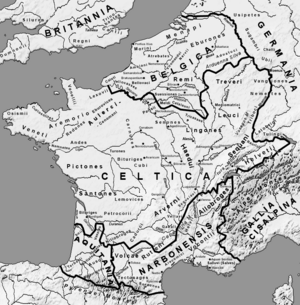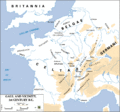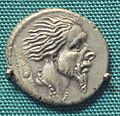Gaul facts for kids
Gaul (called Gallia in Latin) was a large area in ancient Western Europe. It included what is now France, Belgium, western Switzerland, and parts of Italy, the Netherlands, and Germany. Many different Celtic tribes lived in this region. The ancient Romans called these people "Gauls."
Sometimes, the word "Gaul" can mean the land itself, and sometimes it means the people who lived there. These people spoke a language called Gaulish language. So, "Gaul" and "Celt" are often used to mean the same thing when talking about these ancient people.
Contents
What Was Ancient Gaul?
Gaul was a huge territory. It stretched from the Alps mountains in the south to the Rhine river in the east. The Atlantic Ocean was to its west. This land was home to many different Celtic groups. Each group had its own leaders and customs.
Who Were the Gauls?
The Gauls were brave and skilled warriors. They were also good farmers and craftspeople. They lived in villages and towns. They built strong forts on hills. These forts were called oppida. Gauls were known for their metalwork, especially their beautiful gold and silver jewelry. They also made excellent tools and weapons.
Gauls and the Roman Empire
The Gauls often fought with the growing Roman Empire. One famous event happened around 390 BC. A Gaulish leader named Brennus led his warriors to attack the city of Rome. They won a big battle called the Battle of the Allia. They even captured Rome for a short time. This event was a big shock to the Romans.
For many years, the Romans and Gauls had conflicts. Eventually, the Romans, led by Julius Caesar, conquered Gaul. This happened during the Gallic Wars (58–50 BC). After this, Gaul became a part of the Roman Empire. The Gauls slowly adopted Roman ways, including their language and culture.
Images for kids
-
A map of Gaul in the 1st century BCE, showing the relative positions of the Celtic ethnicities: Celtae, Belgae and Aquitani.
-
Massalia (modern Marseille) silver coin with Greek legend, 5th–1st century BC.
-
Roman silver Denarius with the head of captive Gaul 48 BC, following the campaigns of Julius Caesar.
See also
 In Spanish: Galia para niños
In Spanish: Galia para niños
 | Madam C. J. Walker |
 | Janet Emerson Bashen |
 | Annie Turnbo Malone |
 | Maggie L. Walker |










